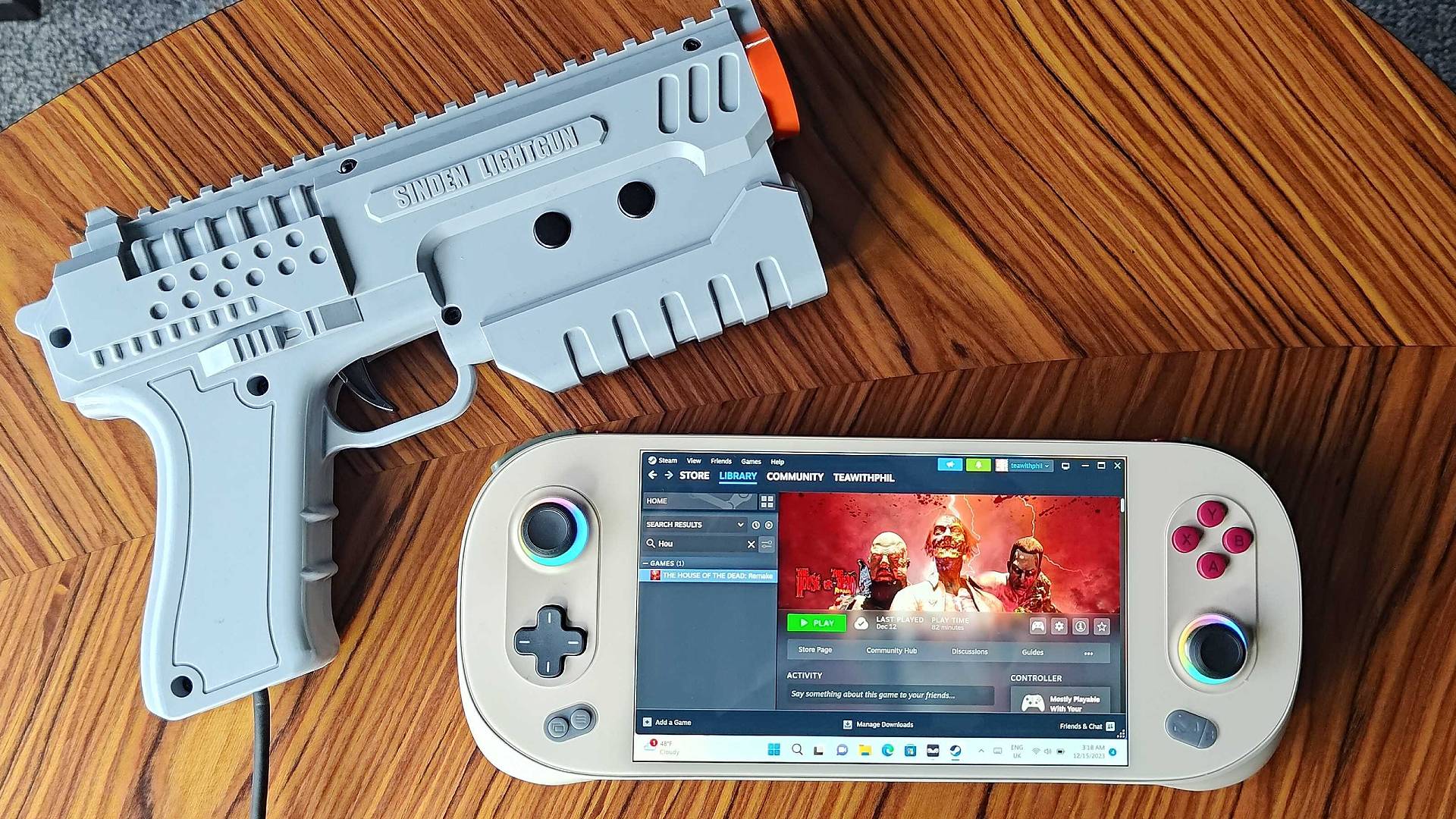
As a retro gaming enthusiast, I am a complete sucker for old light gun games. The only problem is, my local amusement center just retired its long-standing House of the Dead 2 arcade cabinet, and using console alternatives like the PS2 Namco GunCon requires fishing an old CRT TV out of storage. Simply put, the whole affair felt like an out-of-reach faff. At least, that was the case until I realized I could put together a small and authentic arcade light gun system in my living room. So, since the Holiday season is upon us, I thought it'd be a good idea to cover what I used to make it happen, as you'll be able to put your own setup together over Christmas.
Admittedly, there are various ways you can put together this arcade setup, but there’s one key element that’s mandatory - a Sinden Lightgun. I’ll get onto why the peripheral is key, but once you’ve got the sidearm to hand, you’ll be able to pick up everything else at your leisure. Some of you may already be rocking the best gaming TV at home, and you'll technically be able to use any capable gaming PC to put together this setup, but perhaps my setup will lend some inspiration in any case
My Sinden Lightgun review is now live if you want a closer look at the peripheral, but here’s a rundown of what it actually is. Dressed up just like an original Namco GunCon, the PC controller uses a combination of clever tech and software to replicate the experience of retro light guns on modern displays. Whether you’re looking to play modern releases like House of the Dead Remake on Steam or you need a way to revisit emulated classics like Time Crisis, this accessory is going to have you playing like it's 1999. That’s perhaps a bit cheesy even for me, but this thing even has recoil and pedal support, so it’s technically better than anything you could have achieved at home before.
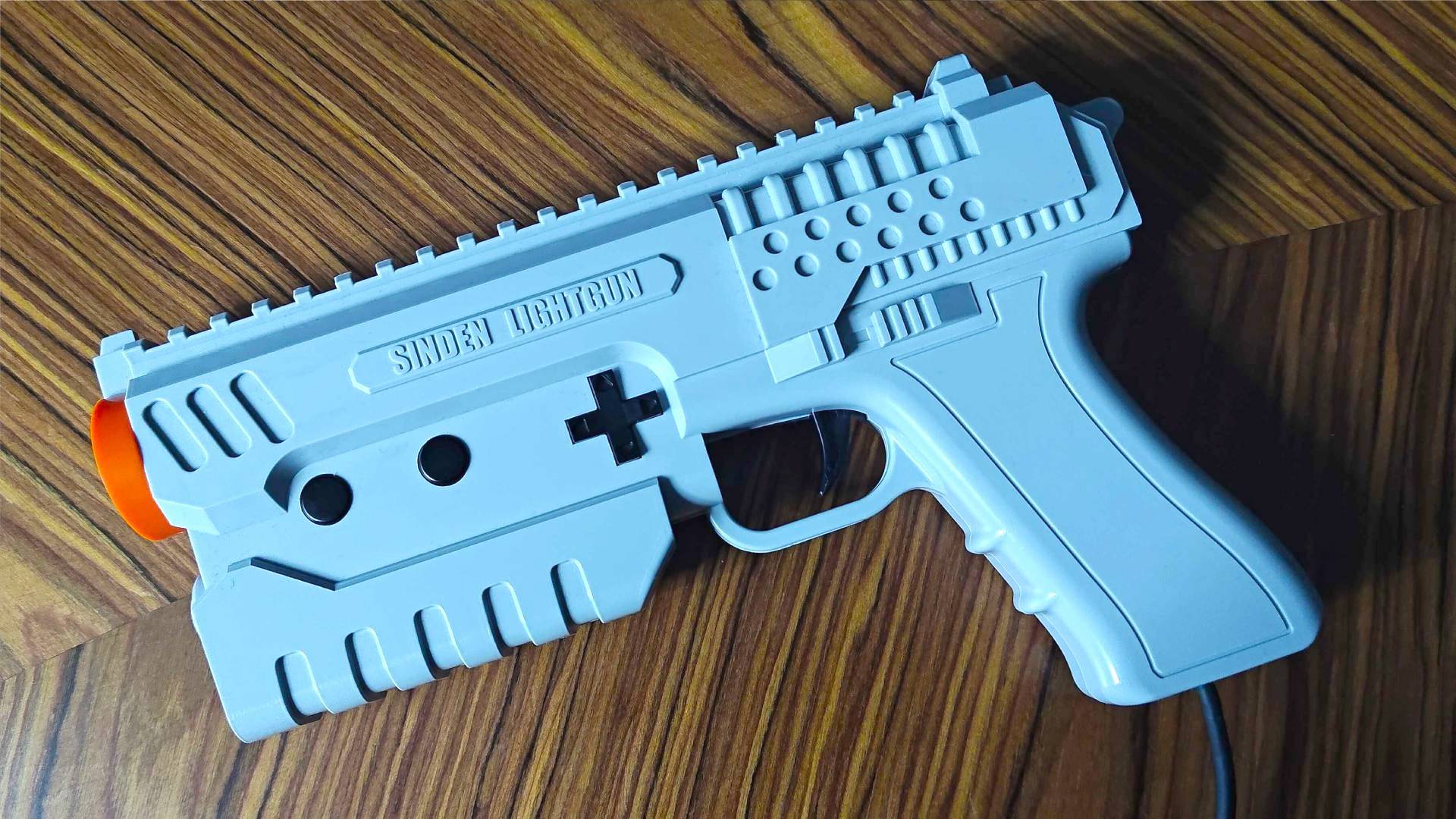
1. A Sinden Lightgun
As we’ve already covered, the Sinden Lightgun is a key part of this whole project, and you won’t be able to use any alternatives in its place. Over at the official store, you’ll find various bundles that include multiple guns and foot pedals, so you’ll be able to decide how much money you actually want to invest in this. A single piece is going to set you back $104.99, which I’d argue is a fair price considering the tech inside and the fact they’re made by a small company in the UK.
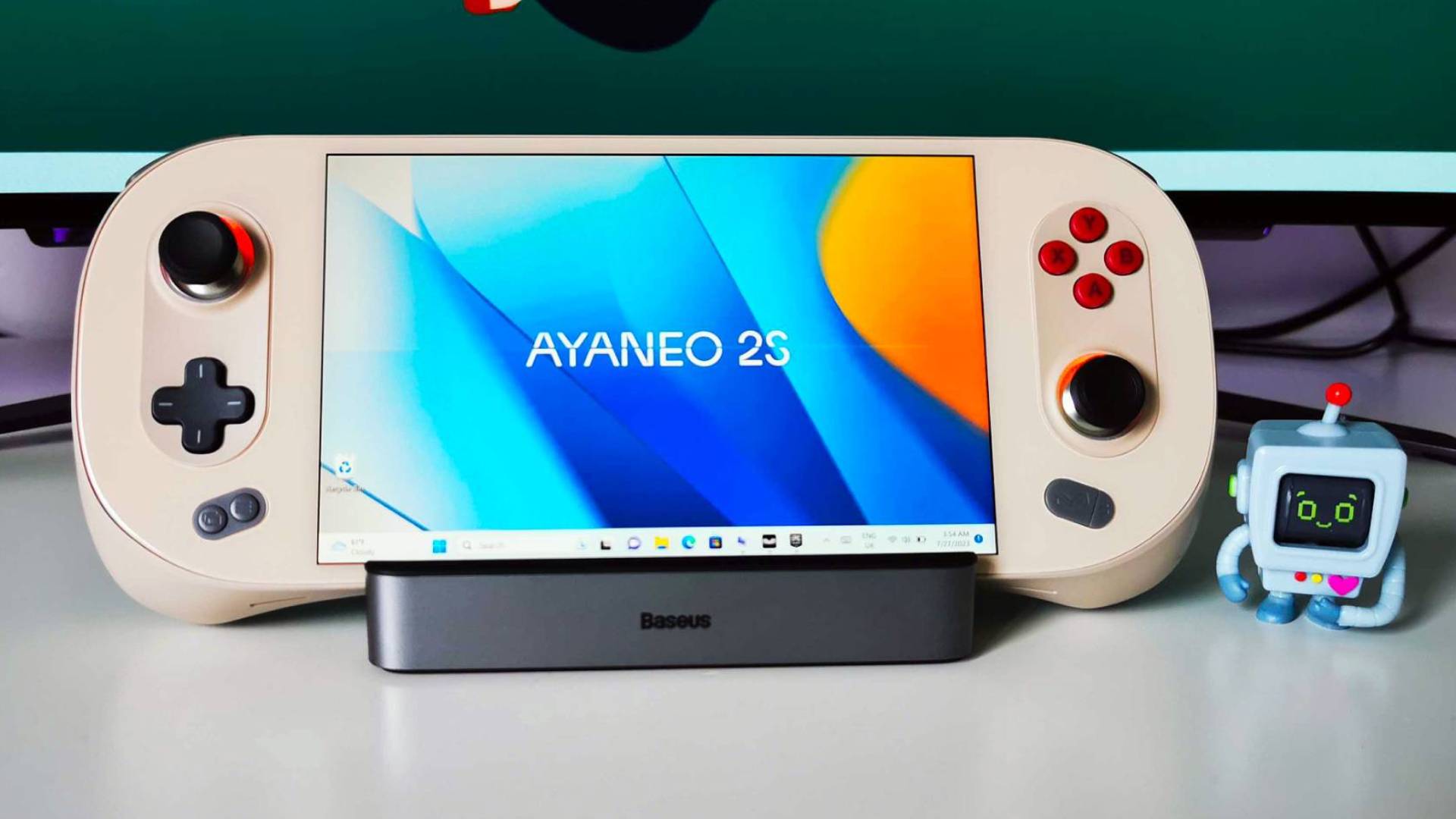
2. A Windows gaming handheld (or mini PC)
The Sinden Lightgun will work with any PC, but my setup trades a traditional bulky rig for one of the best gaming handhelds around. Specifically, I decided to use the Ayaneo 2S, as while I'd normally opt for the Steam Deck instead, SteamOS support is still in the early stages. If you own neither of those, I'd actually suggest seriously considering an Asus ROG Ally instead, as it's currently down from $699.99 to $599.99 over at Best Buy.
For what we're going to be using this setup for, there shouldn't be a noticeable difference in using the Asus ROG Ally instead of the Ayaneo 2S. Sure, the handheld I've got to hand boasts a beefier AMD Ryzen 7 7840U APU, but performance should be around the same in practice. Plus, the ROG Ally is our favorite handheld gaming PC overall thanks to its balance of price and specs, so it won't disappoint when you switch to playing with your fingers and thumbs.
Alternatively, you could also use a tiny rig to achieve the same sort of compact setup, and something like the Ayaneo Retro Mini PC could fit the bill. Just like with a handheld, your mileage will vary when it comes to newer releases, but it should be able to handle Steam's selection of light gun romps and some PS2 emulation.
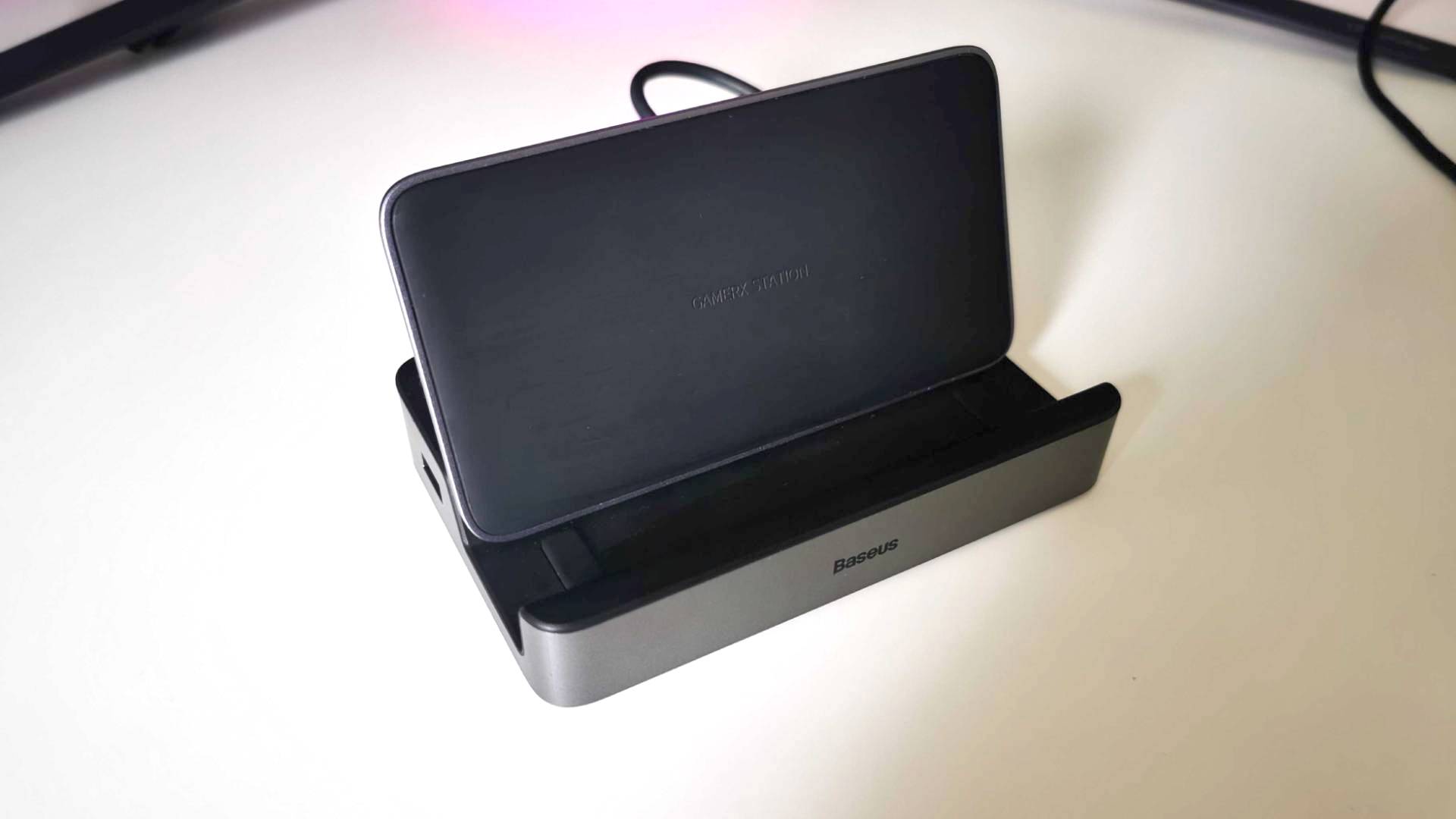
3. A docking station
We might not be using Valve's handheld for this project, but the next piece of the puzzle requires shopping around for the best Steam Deck dock. The Ayaneo 2S and Asus ROG Ally will play nicely with most docking stations out there, and I've tested most options using both portable powerhouses.
My personal go-to Steam Deck dock is the Baseus 6-in-1 docking station, as it's got plenty of ports and an adjustable cradle that fits most handhelds. Annoyingly, it went out of stock recently, so my next recommendation would be the Jsaux 6-in-1 dock instead. It's still going to provide your device with plenty of juice to power your light gun and send visuals to your screen of choice, and it's pretty affordable compared to the official Valve accessory.
If you fancy opting for another docking station, I'd bear two things in mind. Firstly, make sure you pick something with 100W Power Delivery, as you'll need enough juice to power the Sinden Lightgun, your Windows handheld of choice, and other peripherals. You'll also want to make sure you pick something with enough ports, as while we'll be primarily using the light gun for gameplay, a mouse and keyboard will come in handy for setup.
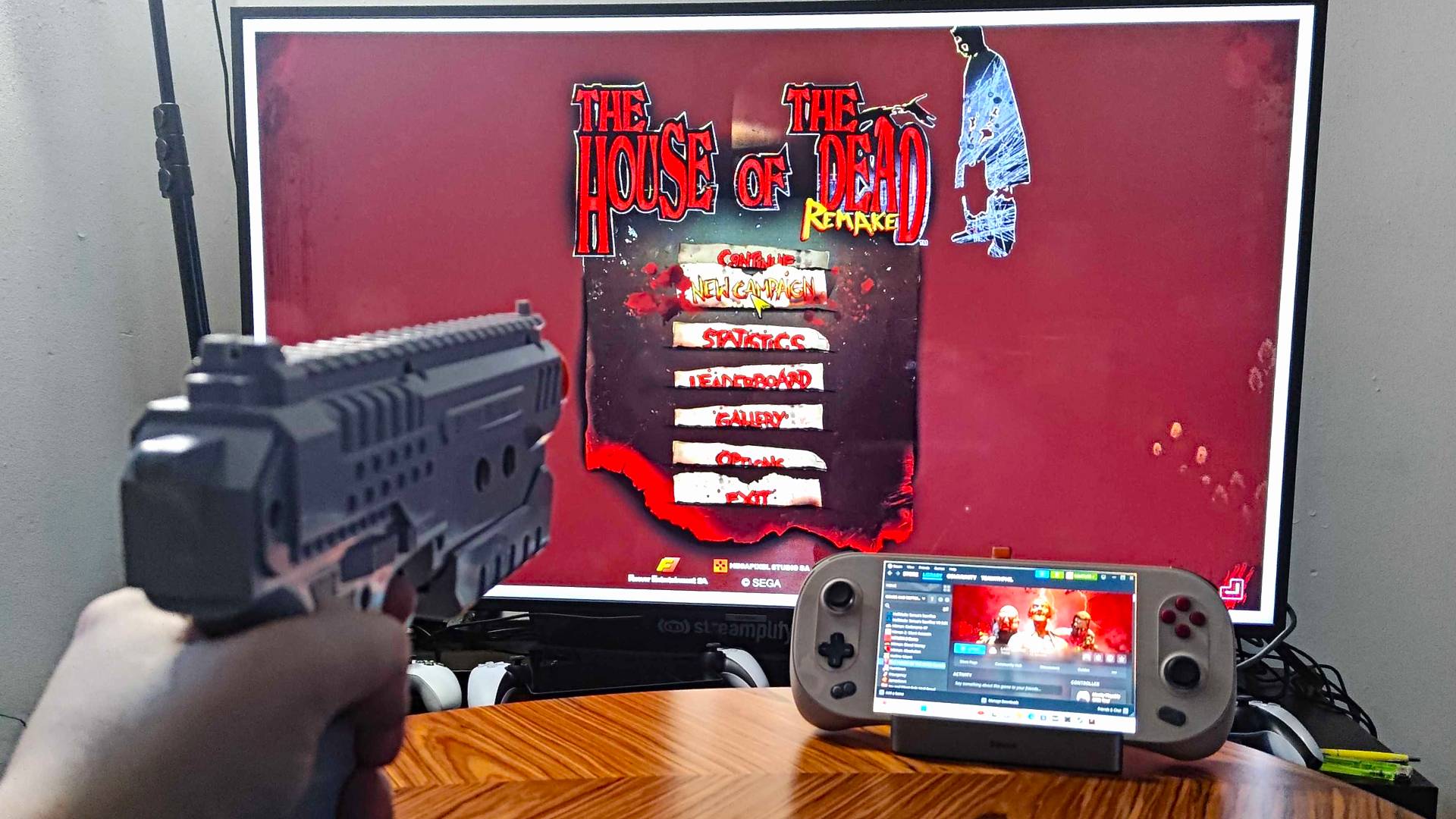
4. A decent-sized screen
Without some sort of screen, you aren't going to get far, and chances are you've already got one at home. That'll effectively save you from having to shop for a new gaming TV, but since we're talking about my setup, I'll point you towards the 50-inch Samsung TU690T, as it's the same as the older display dwelling in my living room at the moment.
While I'm currently using a larger TV, I can confirm this setup also works wonderfully with smaller displays. That means you could browse the best gaming monitors and emerge with a screen specifically for this kind of setup. If I were buying a screen specifically for this setup, I'd be tempted to opt for something like the Dough Spectrum One, especially since it's still down from $699 to $599 following a previous Black Friday discount.
5. 8BitDo Retro Mechanical Keyboard
This part is purely optional, but 8bitDo's NES-inspired keyboard has something that'll come in weirdly handy when playing light gun games. I mean, it also just looks the part, and it's going to feel even more appropriate if you're aiming to play old Nintendo games like Duck Hunt. However, I've actually been using its comically sized A and B buttons as makeshift reload pedals, which isn't as daft an idea as you'd think.
Not only is 8bitDo's Famicom Keyboard tribute wireless, but it boasts both Bluetooth and 2.4 GHz via a dongle. Naturally, that means you'll be able to quickly switch from another PC to your light gun setup whenever it's required. That could be the excuse some of you have been waiting for to upgrade your existing gaming keyboard, even if it does prioritize aesthetics over practicality.
If you'd prefer something more couch-friendly, I'd probably use the likes of the Logitech K400 Plus. It's lightweight, has a trackpad built-in, and runs off of AA batteries, not to mention it boasts 2.4 GHz wireless. That's certainly more of a less fuss approach than using a keyboard that's around the same size as a Commodore 64, but I'm still into that regardless.
And just like that, you've got yourself a compact light gun arcade setup that doesn't take up a lot of room, requires a crusty old CRT, and can live in your living room without being that intrusive. If you've already got some of these bits lying around, you're already halfway there, but you'll hopefully be able to snag some decent savings on anything you don't have if you've thrifty about it.
Looking for something that'll run the latest games? Check out the best gaming PCs for a selection of powerhouse rigs. You'll also want to peek at our best gaming laptop picks if you're after something more mobile.





